Recently in the #4OCFPLN, Kristin Nan asked for us to pen what our small group meant to each of us. In short, this group of educators provides me with daily discourse from a variety of educational perspectives on a limitless number of topics in a digital (audio, video, and text) platform that I carry in my pocket. How many educators have truly found “their tribe”? And, what do you do if you are facing a school year as a new teacher or as an educator new to a position/building/district?
The answer is: Find your marigolds.
Jennifer Gonzalez, in her widely shared post “Find Your Marigold: The One Essential Rule for New Teachers” on her Cult of Pedagogy website, discusses marigolds:
Marigolds exist in our schools as well – encouraging, supporting and nurturing growing teachers on their way to maturity. If you can find at least one marigold in your school and stay close to them, you will grow. Find more than one and you will positively thrive. ~Jennifer Gonzalez
What incredible and positive advice for a person who is navigating a new garden!
But, what if you are entering a garden that is already familiar to you. You are a veteran teacher with a logbook about the plants in your garden. In fact, you already have labels on the marigolds (and the pesky walnut trees). What can you do? Can you genetically change a walnut tree into a marigold? Maybe. Maybe not.
You can, however, BE a marigold. In your building, there will be educators who are new to your garden or new to their spot in the garden. How can you ease their transition? BE a marigold. This is so simple, free – all you need is a genuine smile – and the results are magical! In practice, marigolds are helpful, encouraging, supportive, and positive. For example, marigolds help when the copy machine is grumpy, answer questions without judgment, brainstorm new ideas and model true collaboration, celebrate successes – particularly when accompanied by a risk-taking adventure, and drop encouraging notes in mailboxes (bonus if chocolates are attached).
Marigolds do not need titles to be marigolds. There is no stipend for this role. But, the benefits are priceless: meaningful relationships that are rich in communication, collaboration, and creativity. Better news: There are no limits to the number of marigolds that can co-exist in a building. In fact, I challenge you to fill your building with them!
Marigolds need other marigolds to thrive. If you are limited in marigolds in your building, remember that we live in a digital world where being connected transcends time and space. Utilize social networks like Twitter and Instagram to meet educators that share your passion! It doesn’t matter where you get your fertilizer, as long as you are positively growing so that you can give your very best to the students you serve.
Please share how you will BE a marigold this year!

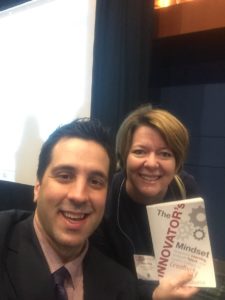 Why this book study? I love The Innovator’s Mindset, as this text served as a catalyst in changing my educational trajectory. Not only was it the professional read for #NCDLCN ’17, George Couros served as the keynote for that year’s
Why this book study? I love The Innovator’s Mindset, as this text served as a catalyst in changing my educational trajectory. Not only was it the professional read for #NCDLCN ’17, George Couros served as the keynote for that year’s 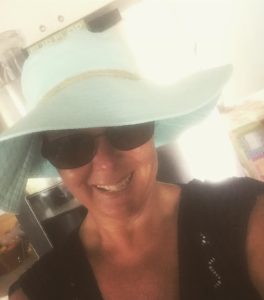
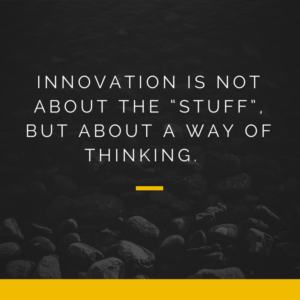 Innovator’s Mindset Day 02: Innovation does not require technology, supplies, or a novel strategy. Instead, it requires a complete shift in mindset. Swap a paper for a blog post. Create Ted-Talks instead of presentations. Solve a campus problem. Create opportunities for relevant work to present to an authentic audience that utilizes students’ voices. That’s innovation. #InnovatorsMindset #InnovatorsMindsetCh1
Innovator’s Mindset Day 02: Innovation does not require technology, supplies, or a novel strategy. Instead, it requires a complete shift in mindset. Swap a paper for a blog post. Create Ted-Talks instead of presentations. Solve a campus problem. Create opportunities for relevant work to present to an authentic audience that utilizes students’ voices. That’s innovation. #InnovatorsMindset #InnovatorsMindsetCh1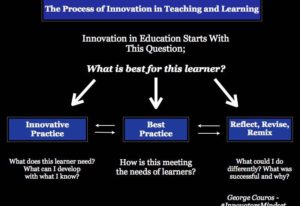 Innovator’s Mindset Day 03: Number 1 Question: What is best for this learner? followed by Would I want to be a learner in my own classroom? Have an honest self-reflection: What is working (or isn’t)? Survey your students. What can be tweaked? What needs to be tossed? Where can you turn for help in brainstorming ways to improve the learning experience for everyone in your learning space – including you? #InnovatorsMindset #InnovatorsMindsetCh2
Innovator’s Mindset Day 03: Number 1 Question: What is best for this learner? followed by Would I want to be a learner in my own classroom? Have an honest self-reflection: What is working (or isn’t)? Survey your students. What can be tweaked? What needs to be tossed? Where can you turn for help in brainstorming ways to improve the learning experience for everyone in your learning space – including you? #InnovatorsMindset #InnovatorsMindsetCh2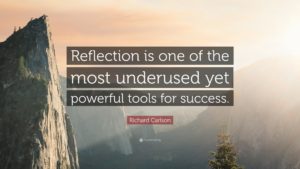
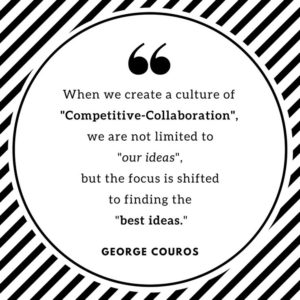 Innovator’s Mindset Day 05: Asking educators to embrace innovation requires a growth mindset, taking risks, and failing forward. For many, this is a huge challenge. Building deep relationships ensures a safe place to try new practices with minimal fear, judgment, or negative consequences. How do I start? I show my own vulnerability first. If I am the first to ask for help or fail, hopefully, others will follow. Remember, we are all learning together! #InnovatorsMindset #InnovatorsMindsetCh4
Innovator’s Mindset Day 05: Asking educators to embrace innovation requires a growth mindset, taking risks, and failing forward. For many, this is a huge challenge. Building deep relationships ensures a safe place to try new practices with minimal fear, judgment, or negative consequences. How do I start? I show my own vulnerability first. If I am the first to ask for help or fail, hopefully, others will follow. Remember, we are all learning together! #InnovatorsMindset #InnovatorsMindsetCh4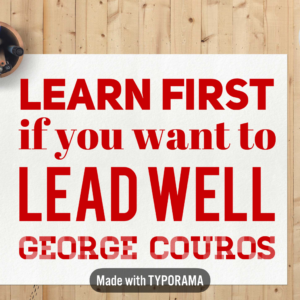 nnovator’s Mindset Day 06: The initiative that I would most like to see is Professional Development FOR teachers BY teachers – tech tools, innovative strategies, book studies, everything. I model this through book studies like this that I participate in and share with colleagues + I am leading a district initiative that launches our first 10 courses later this year. #InnovatorsMindset #InnovatorsMindsetCh5
nnovator’s Mindset Day 06: The initiative that I would most like to see is Professional Development FOR teachers BY teachers – tech tools, innovative strategies, book studies, everything. I model this through book studies like this that I participate in and share with colleagues + I am leading a district initiative that launches our first 10 courses later this year. #InnovatorsMindset #InnovatorsMindsetCh5 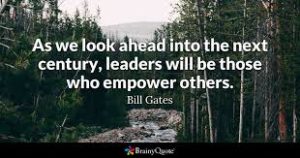 Innovator’s Mindset Day 07: I build leadership capacity in my students by providing them with a nearly unlimited amount of choice in my classroom – seating, pacing, order, grouping, environment, artifact of mastery. I also weave in Teacher Progress Reports that provide feedback for me based on what students think is most important – and, together, we problem solve ways to improve what they decide is not “up to par”. With feedback and reflection a two-way street, we all have ownership of the learning environment. #InnovatorsMindset #InnovatorsMindsetCh6
Innovator’s Mindset Day 07: I build leadership capacity in my students by providing them with a nearly unlimited amount of choice in my classroom – seating, pacing, order, grouping, environment, artifact of mastery. I also weave in Teacher Progress Reports that provide feedback for me based on what students think is most important – and, together, we problem solve ways to improve what they decide is not “up to par”. With feedback and reflection a two-way street, we all have ownership of the learning environment. #InnovatorsMindset #InnovatorsMindsetCh6